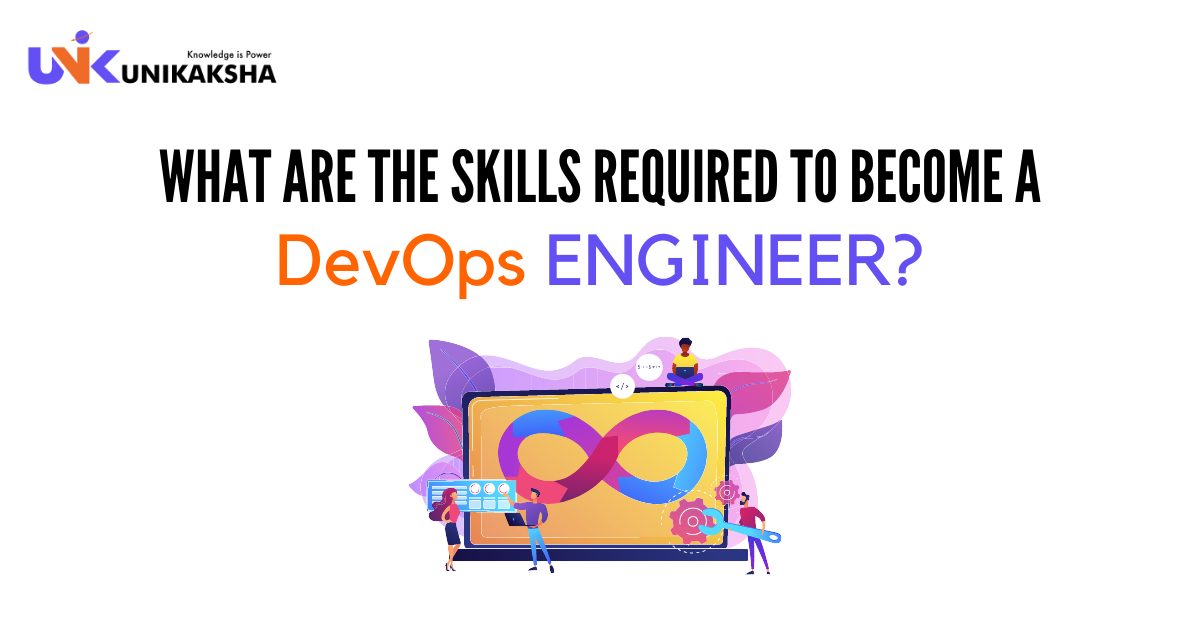How to become a DevOps Engineer in the Year 2022

Development and operations (DevOps) is an amalgamation of principles, approaches, and tools that assist in speeding up and regulating the development and deployment of software applications. The product optimization and engineering become notably faster and staff member cohesion grows upon the successful introduction of DevOps. The reduced developed terms drift the focus more upon improving the customer service and other important organizational goals.
DevOps is a challenging job that requires thorough knowledge, adequate experience, and an extensive skill set in the field. The demand for DevOps Engineers has grown rapidly in the last 3-4 years. According to IDC’s latest predictions, the DevOps market is expected to grow from $2.9 billion to $8 billion by the year 2022. But before we dig deep and find out the ways to become a DevOps engineer, we first need to understand ‘What a DevOps Engineer is?’
Who is a DevOps Engineer?
DevOps Engineers are the IT professionals who work with system operators and developers to manage software products release. They introduce processes, tools, and approaches to balance all the software development life cycle needs. Right from coding & deployment to maintenance & updates, everything is taken care of by them. The position is intended to create a cooperative environment among all stakeholders for developing customer-oriented products.
What are the roles and responsibilities of a DevOps Engineer?
A DevOps Professionals works with different people from diverse departments to generate and put into practice the software systems. They collaborate with software developers, IT professionals, and quality assurance specialists to manage software releases
As a DevOp Engineer, you would be required to multitask, display flexibility and deal with challenging situations from time to time.
Primarily, a DevOps Professional’s responsibility includes:
- Know computer & programming language
- Writes documentation & specifications for the server-side features
- Lead Software Development & Deployment
- Project Planning
- Monitor operations to maintain performance
- Quality Testing / Assurance
- Maintenance and Troubleshooting
- Security & Automation
What are some Tools used by DevOps engineers?
Typically, a DevOps process consists of 8 phases: Code, Build, Test, Release, Deploy, Operate, and Monitor. There are a number of Open source as well as OEM solutions available that can be used across each of the aforementioned phases.
Some Tools used by DevOps engineers include:
- Git (GitLab, GitHub, Bitbucket) – Version Control Tool
- Maven – Build Tool
- Jenkins, Chef, Puppet, Ansible – Continuous Integration Tool
- Docker, Kubernetes – Container Platforms
- Slack – Communication and Collaboration
- SignalFx, Appdynamics, Raygun, Splunk Cloud – Monitoring, Alerting, and Incident Response Tools
- Selenium, Gremlin – Testing Tool
- Servicenow – IT Ticketing
- The Status Page – Status Service Updates
- Chef – Configuration management
- Nagios – Continuous monitoring
What are the skills required to become a DevOps Engineer?
Certain skills are a must-have to become a DevOps Engineer. Don’t be bewildered by the long list, you can start with one or two and gain some skills with experience.

Here are the lists of skills required to become a DevOps Engineer:
Programming Knowledge
Knowledge of Programming or Scripting language is one of the basic prerequisites to becoming a DevOps Engineer. Learning a few coding languages like Java, Python, Ruby, etc. will make it easier for you to debug chunks of codes, integrate database changes, and automate the deployment lifecycle so that it doesn’t bounce back between the development & deployment thereby saving important time and resources. Also, for a smooth CI&CD (Continuous Integration & Continuous Delivery) process, programming or scripting languages are necessary. However, before choosing any language for DevOps, a person must ensure various characteristics like efficiency, modularity, scalability, and more.
Become a responsible Sysadmin
A System Administrator has to take care of a lot of things. He is supposed to build, deploy, test, troubleshoot, and fix the servers daily. His role is to continuously keep a check on the system’s health and ensure that servers work flawlessly. As a DevOps engineer, you must hone all Sysadmin skills and should also be able to automate all the key processes in the deployment of servers and infrastructure.
First-hand Network and Storage Experience
Network and Storage are essential for any IT organization, as a DevOps professional you should be having solid know-how and expertise in deploying the attained IT network knowledge and storage concepts. As you would be required to work with real-time systems, you should familiarize yourself with several APIs, capacity decisions, and protocols. Start with upskilling on learning scripting language and several deployment and configuration tools. You should also equip yourself with public cloud systems like AWS, Azure, and also on OpenStack, Linux.
Deploy Virtualization
As a DevOps engineer, you should be well aware of the virtualization aspect too. You should take charge of the complete process of virtualizing servers and create a copy of the existing network so that the development team and the operations team can work together in proper synchronization. This will ensure a trouble-free testing experience.
Ensuring System Safety & Security
DevOps environment is very fragile. Its overall security involves a certain set of practices built through several techniques, policies, and strategies. It is essential to almost every phase of the DevOps cycle be it development, deployment, testing, or monitoring. Each phase carries some potential threats. For example, almost all deployments are carried out in a cloud environment, therefore adequate security considerations and precautions are to be ensured. Similarly, tools and containers like Kubernetes, Docker, etc. that are used to manage them come with their own set of risks.
As a DevOps engineer, you should be able to:
- Develop and Deploy the policies that are easy to understand and follow by the rest of the team members.
- Be aware of the rights or privileges that should be given to various accounts like admin, root, developer, etc.
- Control and manage privileged access and remove all the dormant accounts
- Automate security processes.
- Introduce security, especially in the early product development lifecycle so that it can be reinforced in the following phases.
Outstanding Testing Knowledge
Testing is considered the most valuable aspect of Software development and delivery. As a DevOps professional, you should be able to understand how the testing works and ensure that all stages are thoroughly tested to attain maximum efficiency. You are required to have hands-on experience with the automation tools that are used during the testing process. Trust me, DevOps is more about preventing than finding the errors!
Deep Knowledge of Automation Tools
DevOps as a process involves a lot of automation tools and technologies. From creating code to developing, testing, and ultimately deployment, everything requires automation. Even the monitoring and post-development process testing is automated thereby ensuring effective integration and quicker results. As a DevOps aspirant, you need to be fully aware and instrumental with such tools and should be able to deploy them during the setup. Some of such tools include Chef, Puppet, Ansible, Chef, Salt, Kubernetes, Docker, Jenkins, Nagios, and more.
Effective Communication and Soft Skills
Good Communication and Soft skills are the primary requirement for the DevOps engineer’s success and growth. He/she is a mediator between development and IT teams and should be able to communicate well with them. Apart from that, DevOps professional is always a part of core meetings and interactions. Communicating the right points at right time is essential for a project’s success. The need to have the right mix of soft skills, good communication, and the right people skill will land you in any job and not just that of the DevOps Professional.
By now you must be well aware of all the required skills to become a DevOps Professional. Furthermore, let’s have a look at several DevOps Certification Training Courses that not only enhance your knowledge but also will enable you to land your dream job as DevOps Engineer. These certifications include Docker Certified Associate, Azure DevOps Engineer, Puppet Professional Certification, and many more.
Learn in-Demand tech skills with 100+ Courses and Certifications with multilingual support, 24×7 doubt clearing sessions, and regular assessments to track progress via a distinct Social media-like experience (FB) at UniKaksha So if you’re looking to get into DevOps, this is a complete breakdown of what you need to do. Although being in the field is rewarding and challenging all at once, it’s important to remember that it isn’t an easy journey to take on so there are boundless opportunities for those who wish to conquer it!
What do you have to say? Feel free to share your thoughts in the comments.
About the Author
Sonali is an accomplished Author, Content Writer, Copywriter, and Ghostwriter, known for her ability to create engaging and captivating communications. With over 11 years of experience, she has developed a diverse industry background in Education, Travel, Retail, Events, and Fashion . Quality over quantity is what she firmly believes in. At UniKakhsa, she leads a team of talented technical writers, dedicated to delivering valuable content to readers through our blogs.
 Related Posts
Related Posts
|
Offerings
|
FutureFirst
|
SmartStart
|
GradEdge
|
SelfMastery
|
|---|---|---|---|---|
|
Doubt clearing session
|
                                          |
                                          |
                                          |
                                          |
|
No of job opportunities
|
15 | 25 | 15 | 3 |
|
Course Access
|
5 Years | Lifetime | Lifetime | 5 Years |
|
Free Library Courses
|
                                          |
                                          |
                                          |
                                          |
|
Job Assurance
|
                                          |
                                          |
                                          |
                                          |
|
Language
|
English/Hindi | 5 Language options | English/Hindi | English/Hindi |
|
Live classes
|
100% | 100% | 100% |                     |
|
Offline
|
                                          |
                                          |
                                          |
                    |
|
Industry Expert Sessions
|
                    |
                                          |
                    |
                    |
|
Internship (IOP)
|
                                          |
Guaranteed | Guaranteed | Based on evaluation |
|
1:1 Mentoring sessions
|
                    |
                                          |
                    |
                    |
|
Customer Support
|
                                          |
                                          |
                                          |
                                          |
|
Dedicated Program Manager
|
                    |
                                          |
                    |
                    |
|
Opt for Placement services
|
Compulsary |                                           |
                                          |
                                          |
|
Career Support
|
1 Year | 18 Months | 1 Year | 3 Months |
|
Regular assessments
|
                                          |
                                          |
                                          |
                                          |
|
Report cards
|
                                          |
                                          |
                                          |
                    |
|
Career Guidance
|
                                          |
                                          |
                                          |
                    |
|
Certificates
|
                                          |
                                          |
                                          |
                    |
|
Scholarship
|
                                          |
Available | Available |                     |
|
Trial Class
|
1 week | 1 week | 1 week |                     |
|
Outside placement
|
Paid | Allowed | Allowed | Allowed |
|
Premium Jobs
|
                    |
                                          |
                    |
                    |
